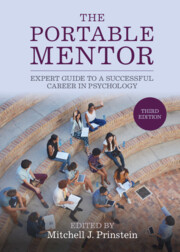Book contents
- The Portable Mentor
- The Portable Mentor
- Copyright page
- Dedication
- Contents
- Figures
- Tables
- Boxes
- Contributors
- Preface
- Acknowledgments
- Part I Applying to Graduate School
- Part II Beginning your Career
- 3 Your First Year of Graduate School
- 4 Following the Scientific Path in Applied Psychology
- 5 Impostor Syndrome in Graduate School
- 6 Cultural Humility in Psychology
- 7 Graduate Training for Students of Color: Belonging Required; Fitting In, Not Recommended
- 8 Navigating Graduate School in Psychology as a Sexual and/or Gender Minority (LGBTQ+) Student
- 9 Considerations for First-Generation Students in Graduate School
- 10 Developing and Practicing Ethics
- Part III Your Research/Academic Career
- Part IV Your Career as a Practitioner
- Part V Your Professional Service Career
- Part VI Your Career After Graduate School
- Index
- References
5 - Impostor Syndrome in Graduate School
from Part II - Beginning your Career
Published online by Cambridge University Press: 21 July 2022
- The Portable Mentor
- The Portable Mentor
- Copyright page
- Dedication
- Contents
- Figures
- Tables
- Boxes
- Contributors
- Preface
- Acknowledgments
- Part I Applying to Graduate School
- Part II Beginning your Career
- 3 Your First Year of Graduate School
- 4 Following the Scientific Path in Applied Psychology
- 5 Impostor Syndrome in Graduate School
- 6 Cultural Humility in Psychology
- 7 Graduate Training for Students of Color: Belonging Required; Fitting In, Not Recommended
- 8 Navigating Graduate School in Psychology as a Sexual and/or Gender Minority (LGBTQ+) Student
- 9 Considerations for First-Generation Students in Graduate School
- 10 Developing and Practicing Ethics
- Part III Your Research/Academic Career
- Part IV Your Career as a Practitioner
- Part V Your Professional Service Career
- Part VI Your Career After Graduate School
- Index
- References
Summary
Impostor syndrome refers to internal beliefs of intellectual incompetence among high-achieving individuals that are typically accompanied by difficulties internalizing success and chronic fears of being discovered as a “fraud.” Graduate school is a prime context for impostor cognitions to flourish, given the unique stressors and experiences that often characterize this unique academic stage. Despite the largely ubiquitous nature of impostor syndrome among graduate students (and professors), impostor cognitions are rarely openly discussed, nor are the factors that make this harmful thinking pattern worse. Thus, the purpose of this chapter is to provide an overview of impostor syndrome, factors that may influence the intensity of impostor cognitions, and ways that graduate students can adaptively navigate these unhelpful ways of thinking.
Keywords
- Type
- Chapter
- Information
- The Portable MentorExpert Guide to a Successful Career in Psychology, pp. 102 - 118Publisher: Cambridge University PressPrint publication year: 2022



